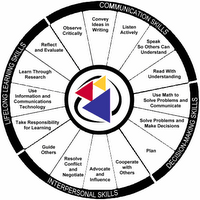Becoming an independent learner: first things first

How to become an independent learner: starting off as you mean to carry on
Robert L. Fielding
The Learning Process
http://www.apa.org/ed/lcp2/lcp14.html
Knowing what a bicycle is and how it works is not the same thing as being able to get on it and ride it. You need to be shown how to do it, and then you need practice doing it before you feel fully confident and able to ride it well.
Most activities are this way, aren’t they. You watch a famous tennis player serving an ace – it looks easy, doesn’t it? But when you try it, you find that it’s a lot more difficult than it looks.
You may have read what an independent learner is (see this site), and have understood what you have read, but that still doesn’t mean you know what to do to become one, does it?
Like learning how to ride a bike or swim or play tennis, you need to be shown a few techniques first, you need to think, and you need to try things out for yourself. After all, to be independent is to act alone, to follow your own intuition and to work out what works for you as well as what doesn’t. Enough said; let’s see what you can do first.
The Independent Learner
Take a self-evaluation test to find out if you are an independent learner or not.
Click here: http://www.ppcc.edu/Academics/DistanceEducation/SelfTest.cfm
Are you the kind of person who wants to be independent?
If you want to do something with your life, want to really achieve something, enjoy life to the full – if you realize that there will be disappointments in your life, that not everything will go as you expect or hope, then learner independence is for you.
If you have some belief in yourself, can take criticism, or would dearly like to be that way, then again, learner autonomy is for you.
First and foremost, the desire to become independent, think independently and act in the same way, according to the dictates of your own conscience, your own feelings, and your own ambitions, is a state of mind. Once you think you want to become an independent learner, here are some of the characteristics you will need to develop and acquire.
Typical characteristics of the independent learner
You are unlikely to possess all these characteristics in equal measure or as outlined below. However, learner autonomy is more of a process – perhaps one without an end, rather than a state. Don’t mourn the fact that you do not possess these qualities in abundance, but rather work on each of them in order to increase your independence as a learner. Here are the categories.
- diligence
- ability to concentrate
You need your friends and significant others to give you the space, the peace and quiet and the time to exercise your mental capacities, and you need to have the self-discipline, the tenacity and stamina to work things through until you know what they mean.
- motivation
Motivation; wanting to do the thing you are doing or have to do is everything. Being motivated can and will make all the difference to how independent you become, and how successful you are for make no mistake, achieving learner autonomy will require a lot of work, but it will be worth it in the end.
- conscientiousness
- an ability to reflect critically on what you do
- Where is what I am doing right now leading me?
- Am I on the right path doing this?
- Why did I do it this way and not the other way?
- Can I improve my methods?
- What have I learned?
- How will I know if and when I have been successful?
- an ability to correct oneself
- an ability to choose tasks based on one’s language ability
- an awareness that different tasks demand a different type of knowledge
- Spelling
- Meaning
- Part of speech
- Pronunciation
- Which words it normally accompanies
- How often it is used
- The register in which it is most commonly used
- an awareness of how you learn and how to progress: the learning process
Manage your time
- Actively identify or decide what is most important and most urgent
- Balance your studies and your own time
Make sure you do not neglect friends and family members – though they will have to get used to seeing a little less of you when you are busy – explain this to them and they will support you – that’s what friends and family members do.
- Use your time effectively – know where you need to be to get what you need
Here are some links for more information on how to manage your time.
http://www.mdx.ac.uk/www/study/Timetips.htm
http://gradschool.about.com/cs/timemanagement/a/time.htm

3 Comments:
Thank you very much for posting this article on the web . Such an illuminating piece of writing.
Thank you for sharing your great experience as article. Thanks a lot.
very helpful and motivating.
Thanks
Post a Comment
Subscribe to Post Comments [Atom]
<< Home